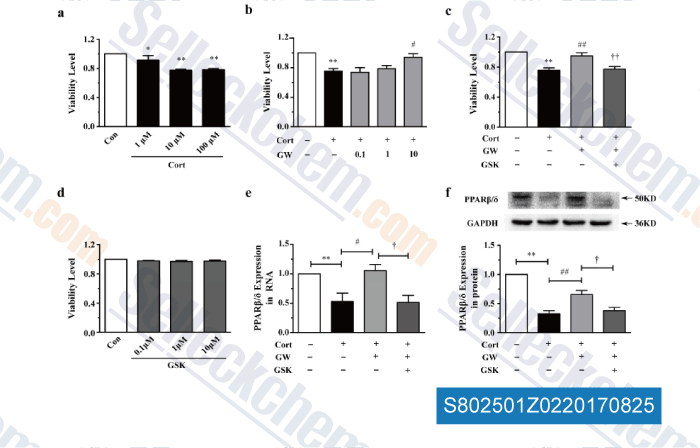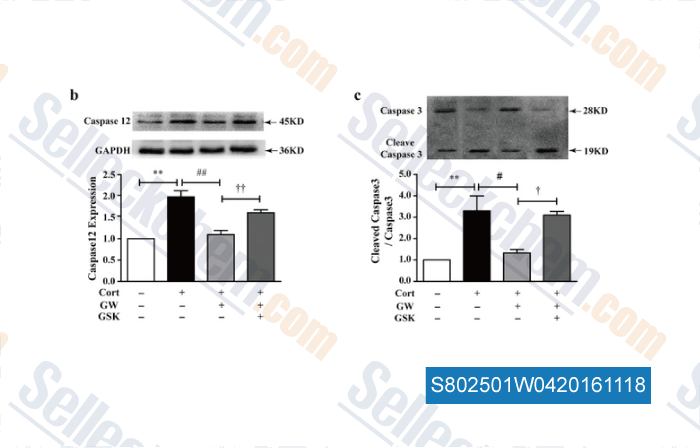|
Toll Free: (877) 796-6397 -- USA and Canada only -- |
Fax: +1-832-582-8590 Orders: +1-832-582-8158 |
Tech Support: +1-832-582-8158 Ext:3 Please provide your Order Number in the email. |
Technical Data
| Formula | C15H12ClF3N2O3S |
|||
| Molecular Weight | 392.78 | CAS No. | 188591-46-0 | |
| Solubility (25°C)* | In vitro | DMSO | 79 mg/mL (201.13 mM) | |
| Water | Insoluble | |||
| Ethanol | Insoluble | |||
|
* <1 mg/ml means slightly soluble or insoluble. * Please note that Selleck tests the solubility of all compounds in-house, and the actual solubility may differ slightly from published values. This is normal and is due to slight batch-to-batch variations. * Room temperature shipping (Stability testing shows this product can be shipped without any cooling measures.) |
||||
Preparing Stock Solutions
Biological Activity
| Description | GSK3787 is a selective and irreversible antagonist of PPARδ with pIC50 of 6.6, with no measurable affinity for hPPARα or hPPARγ. | ||
|---|---|---|---|
| Targets |
|
||
| In vitro | GSK3787 irreversibly antagonizes human and mouse PPARδ that covalently modifies Cys249 within the ligand binding pocket. GSK3787 (1 μM) effectively antagonizes the agonist GW0742 stimulated transcription of CPT1a and PDK4 in human skeletal muscle cells, and effectively antagonize the basal gene expression of CPT1a. GSK 3787 shows no effective antiproliferative activity against colorectal cancer cells. [1] GSK3787 (1 μM) completely antagonizes 50 nM GW0742-induced PPARβ/δ-dependent Angptl4 gene expression in wild-type fibroblasts and in keratinocytes. GSK3787 (1 μM) largely antagonizes 50 nM GW0742-induced Angptl4 and Adrp mRNAs expression in skin cancer cell A341. GSK3787 (1 μM) largely antagonizes GW0742-induced Angptl4 mRNAs expression in cancer cell lines MCF7 (breast), Huh7 (liver), and HepG2 (liver) cells but not in H1838 or A549 cells (lung). GSK3787 (1 μM) largely antagonizes GW0742-induced increase of Adrp mRNA in Huh7 and HepG2 cells but not in H1838 cells. GSK3787 does not antagonize basal expression of either of these two PPARβ/δtarget genes in these cells. Neither GW0742 nor GSK3787 has any effect on cell proliferation of these cells at concentrations ranging from 0.1 to 10 μM. GSK3787 is able to modulate the association of both PPARβ/δ and PPARγ coregulator peptides in response to ligand activation. Efficacy of GSK3787 to modulate PPARγ activity is markedly lower than the efficacy of GSK3787 to act as a PPARβ/δ antagonist. [2] |
||
| In vivo | GSK3787 antagonizes ligand-induced PPARβ/δ-dependent gene expression in vivo. Oral administration of GSK3787 has no effect on the expression of Angptl4 and Adrp mRNA in mouse colon epithelium. Coadministration of GSK3787 (10 mg/kg) effectively prevents the GW0742-induced expression of both Angptl4 and Adrp mRNA in wild-type mouse colon epithelium, which is correlated with reduced promoter occupancy of PPARβ/δ on the Angptl4 and Adrp genes. Administration of GSK3787 had no effect on glucose tolerance. [2] |
Protocol (from reference)
| Kinase Assay: |
|
|---|
References
|
Customer Product Validation

-
Data from [Data independently produced by , , Neuropharmacology, 2017, 113(Pt A):396-406]

-
Data from [Data independently produced by , , Neuropharmacology, 2016, 113(Pt A):396-406. ]
Selleck's GSK3787 has been cited by 13 publications
| Topical hADSCs-HA Gel Promotes Skin Regeneration and Angiogenesis in Pressure Ulcers by Paracrine Activating PPARβ/δ Pathway [ Drug Des Devel Ther, 2024, 18:4799-4824] | PubMed: 39478872 |
| PPARδ inhibition blocks the induction and function of tumor-induced IL-10+ regulatory B cells and enhances cancer immunotherapy [ Cell Discov, 2023, 9(1):54] | PubMed: 37291146 |
| PPARδ inhibition blocks the induction and function of tumor-induced IL-10+ regulatory B cells and enhances cancer immunotherapy [ Cell Discov, 2023, 9(1):54] | PubMed: 37291146 |
| PPAR-δ as a prognostic biomarker and its association with immune infiltrates in breast cancer PPAR-δ as a prognostic biomarker and its association with immune infiltrates in breast cancer [ J Cancer, 2023, 14(6):1049-1061] | PubMed: 37151397 |
| Tumor-derived Lysophosphatidic Acid Blunts Protective Type-I Interferon Responses in Ovarian Cancer [ Cancer Discov, 2022, candisc.1181.2021] | PubMed: 35552618 |
| Telmisartan is the most effective ARB to increase adiponectin via PPARα in adipocyte [ J Mol Endocrinol, 2022, JME-21-0239] | PubMed: 35354667 |
| Mesenchymal stem cells alleviate experimental immune-mediated liver injury via chitinase 3-like protein 1-mediated T cell suppression [ Cell Death Dis, 2021, 12(3):240] | PubMed: 33664231 |
| Transcription Factor TWIST1 Integrates Dendritic Remodeling and Chronic Stress to Promote Depressive-like Behaviors [ Biol Psychiatry, 2020, S0006-3223(20)31906-5] | PubMed: 33190845 |
| Identification of a rhodanine derivative BML-260 as a potent stimulator of UCP1 expression. [ Theranostics, 2019, 9(12):3501-3514] | PubMed: 31281493 |
| Meningitic Escherichia coli Induction of ANGPTL4 in Brain Microvascular Endothelial Cells Contributes to Blood-Brain Barrier Disruption via ARHGAP5/RhoA/MYL5 Signaling Cascade [ Pathogens, 2019, 8(4)E254] | PubMed: 31766605 |
RETURN POLICY
Selleck Chemical’s Unconditional Return Policy ensures a smooth online shopping experience for our customers. If you are in any way unsatisfied with your purchase, you may return any item(s) within 7 days of receiving it. In the event of product quality issues, either protocol related or product related problems, you may return any item(s) within 365 days from the original purchase date. Please follow the instructions below when returning products.
SHIPPING AND STORAGE
Selleck products are transported at room temperature. If you receive the product at room temperature, please rest assured, the Selleck Quality Inspection Department has conducted experiments to verify that the normal temperature placement of one month will not affect the biological activity of powder products. After collecting, please store the product according to the requirements described in the datasheet. Most Selleck products are stable under the recommended conditions.
NOT FOR HUMAN, VETERINARY DIAGNOSTIC OR THERAPEUTIC USE.
